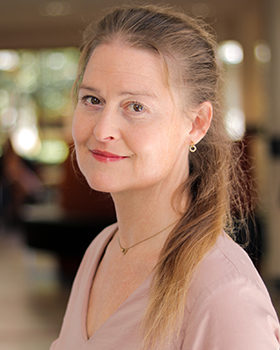2011-2021: Generational shift - The BUP 2.0
Text by PhD, Associate Professor Madeleine Granvik
Director of the BUP 2017 - ongoing
Sooner or later, it happens in all organisations, and The Baltic University Programme (BUP) is no exception: the time for a critical mass of colleagues engaged in the Programme to begin their retirement years. For the BUP, this generational shift started around 2015 and led to several changes regarding organisation and management. New academic initiatives took place. During this transitional period, our priority was first to develop the cooperation within the BUP, to focus on the participating universities, and to have functional National Centres, Secretariats, and to employ new staff. To tweak the old and adopt new routines and policies.
Heading into a new period
The BUP International Board decided at the end of 2015 to conduct a survey to find out what opinions and ideas colleagues in the BUP had for the future of the Programme. The ambition was to have an open, transparent, and inclusive working process. Thanks to both the survey, and other meetings and conferences, we received valuable input that informed our future strategy. During 2016 the Programme celebrated 25 years of cooperation, and left its status as a project to become a permanent institution. Bilateral contracts between the BUP and universities were signed at the level of Rectors, and the participating institutions started to contribute with an annual fee. Around 60 universities joined that year.
At this time, the BUP presidency was introduced as a new organisational feature. Holding a BUP presidency, is done by every BUP National Centre during a six months period. The National Centres put their own signature on BUP events, enriching the network with new ideas and practices, while also gaining more visibility for themselves. The BUP National Centres also went through a process of renewal and formalisation, and the Programme had the pleasure of welcoming six new Centre Directors. The role and responsibilities of BUP National Centres were strengthened and evolved.
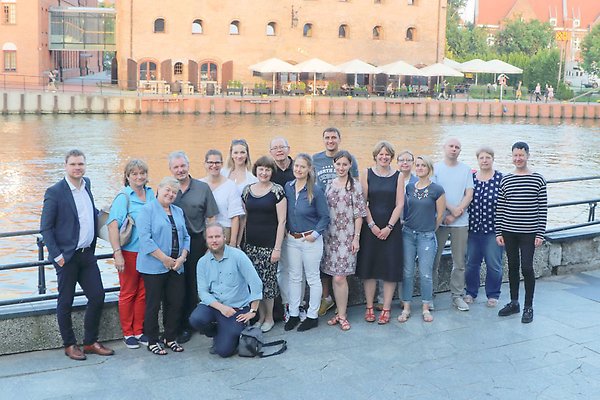
Group photo of the participants at the Centre Directors’ meeting in Gdansk, Poland, in 2019. Photo: Pontus Ambros
In this time period, there were also discussions concerning the work of the BUP in relation to the UN 2030 Agenda for Sustainable Development and its 17 goals. It was decided that the Programme should give the goals even more attention and to state clearly that we promote and encourage inter-, multi- and transdisciplinary cooperation’s where different academic disciplines and perspectives on sustainable development meet. The BUP is strongly convinced that universities play a central role in the development of societies through education of the young generation and by conducting relevant research contributing to sustainability. In connection to the UN Sustainable Development Goals, the BUP also defined and adopted ten focus areas, the ten BUP themes:
- Climate Change,
- Energy Systems,
- Sustainable Societies,
- Sustainable Water Resources,
- Urban-Rural development,
- Sustainable Mobility,
- Circular Economy,
- Sustainable Tourism,
- Education for Sustainable Development (ESD), and
- Sustainable Food Systems
Focus on researchers
University teachers, students and researchers have been the primary target groups since the start of the BUP. Most attention during our first 15 years was, however, devoted to developing courses and course material. In the recent years, researchers have been given more attention and various forms of support. In spring 2018, the BUP Research and Publication Office (BUPRaP) was established at the Associated Secretariat at Hamburg University of Applied Science. It gathers and makes available information on open calls for funding programmes, both from the European Union (e.g., Horizon 2020, ERASMUS+, Europe-AID, INTERREG, etc.) and from other grant-awarding bodies. The Office also coordinates publications related to education for sustainable development, environment, sustainable development, and climate change in scientific journals.
Another initiative is the BUP Research Notes Letter, first published for the BUP Rectors’ Conference in 2018. The Research Notes Letter features contributions from researchers who are based at participating universities across the Programme. Publishing helps the authors achieve a greater impact with their research findings. It also represents a space where researchers from the region inform and learn from one another, as well as learn about one another.
Following my vision for the development of the BUP, the first BUP Symposium was organised during 24-25 August 2020. The restrictions linked to Covid-19 put an end to the plans to meet in Visby, and the event was moved online. The Symposium attracted over 200 colleagues to contribute with their research to one of the ten BUP themes, and stressed both the challenges we face and how efforts within different research fields can contribute to the implementation of sustainability in the Baltic Sea Region. As an outcome of the BUP Symposium 2020, there were about 50 scientific papers published in special issues in scientific journals, initiatives taken by me and colleagues acting as guest editors. Since there was a significant interest regarding the Symposium and the special issues, the International Board and the Coordinating Secretariat decided to continue to elaborate this type of academic support and hold the Symposium on an annual basis and continue to cooperate with scientific journals to host special issues.
New ways of supporting young scientists
Since 2012, the BUP has offered a PhD Students Training once a year, which has been organised by the Associated Secretariat in Łodz and taken place in Rogów, Poland. It is an opportunity for PhD students from all disciplines to meet and discuss sustainable development in an interdisciplinary and regional context. The training includes lectures and workshops, and a chance for students to present their PhD work and consult their PhD projects with senior researchers acting as mentors.
Related to this training and in the planning for the BUP Master Thesis Training a Supervisor Collegium was established in 2021. Currently there are about 60 colleagues that have signed up to be a part of the Supervisor Collegium. This makes it possible to also allow for mentorship and supervision to take place during extended time periods and be more formalised. It is an opportunity for PhD students to get a co-supervisor from another university in the Baltic Sea Region and, at the same time, an opportunity for researchers to take on the co-supervisor role. Seniors in this collegium also make up a possible pool of opponents and members of examination committees for PhD students´ defence.
To support talented young scholars, the BUP International Board decided in 2013 to introduce a PhD Award. The idea is to promote novelty research with an interdisciplinary approach, being relevant in a sustainable development perspective in a Baltic Sea Region context. It would find its first laureates in 2014. Since then, the distinction has been given every year to young researchers who successfully competed with their finished PhD projects.
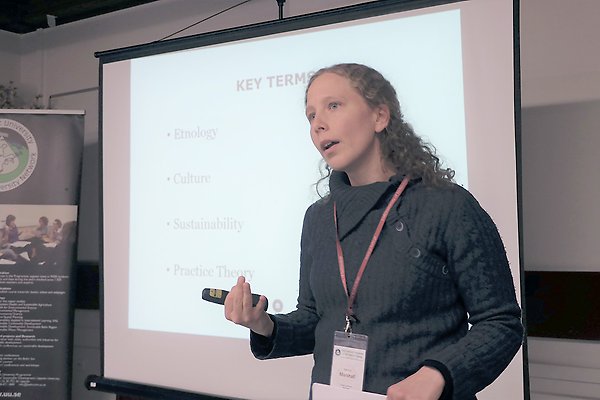
One of our PhD Award winners, Matilda Marshall presenting her research at the 2018 BUP PhD Student Conference Rogow, Poland. Photo: Krzysztof Ciesielski
As internationalisation in practice is one of the main long-term goals of the Programme, young scholars, PhD candidates and postdoctoral fellows have since 2017 been able to apply and compete for Mobility Research Grants. The grant enables the winner to be a guest researcher for a certain time period at a university in the Baltic Sea Region; the Mobility Grant gives the winners a chance to broaden, or establish, their own research network.
Twice as many events for students
The Programme has for many years been hosting a set of regularly organised student activities, such as student conferences, SAIL for students, and summer courses. The number of student activities has in general increased since 2016 and doubled in 2019. To name one of them, BUP students got a chance to embark, for the first time, on a Sea Yawl Voyage in 2019. This led them to Polessk, Russia, from which they sailed in the Curonian lagoon. Like SAIL, the idea is to combine theoretical knowledge with practical hands-on skills, as well as to improve skills in cooperation and boost students´ self-confidence while deepening their knowledge of sustainable development in the Baltic Sea Region.
Students have also become gradually more involved in the organisation of the Programme itself. Since 2019, the BUP Students’ Parliament has convened on a regular basis and clear statues were developed for its organisation. There is also a project aimed at increasing student involvement that we launched in early 2021, the BUP Student Ambassadors Programme. The ambition is to have Student Ambassadors at each participating university. The scope of the proposed activities for Student Ambassadors includes promoting the BUP at their home university, assisting the BUP National Centre in the given country, assist in a small (or a bigger) data collection/research project, and more. The aim is to create a network consisting of active and enthusiastic students, who will support the Programme and “recruit” new students for courses, conferences, and other events.
Teachers in the Programme
Different forms of training for teachers have been organised on a regular basis since the Programme started. Lately, there are two external granted projects, EduBalt and EduBUP, that have been running in the area of Education for Sustainable Development. They were both financed by the Swedish Institute and were realised by the total of around 100 colleagues from nine countries. At the same time, the BUP Associated Secretariat in Finland have been running the course Education for Sustainable Development in Higher Education for teachers, which takes place on an annual basis. The focus of both the course and the projects has been the implementation of the UN Sustainable Development Goals in learning methods in higher education as well as promoting inter-disciplinarity to help teachers develop, experiment with, and practise teaching methods for Education for Sustainable Development. The participants learned how to integrate the Sustainable Development Goals into their own teaching, courses, and study programmes. These activities are part of the BUP lifelong learning education.
Apart from these activities, the BUP has organised SAIL for Teachers. Like students, teachers have had an opportunity to cooperate, network, gain new skills, and expand their knowledge out on the Baltic Sea on a tall ship. Attention has also been paid to teaching materials and courses as the core support for the teachers’ work. After looking at how the current BUP course materials are being used and investigating the general interest in and the need for new course materials, it was concluded that new materials are needed in the form of modules, available online, or, alternatively, as massive open online courses (MOOCs). The development of modules has been initiated by the Climate Change Curriculum project coordinated by the BUP Coordinating Secretariat as well as the German group of colleagues. Thus, several course modules are being developed. The work on modules and massive open online courses will continue during the next strategic period.
Education, digitalisation and new courses and modules
In general, the BUP strives to offer new courses and modules as well as new forms of teaching. The time has come to digitalise the BUP education. We have been especially reminded of the importance of making materials available in digital form by the restrictions due to the Covid-19 pandemic. During 2020 a decision was made to start developing the BUP Course Platform.
Focus is on developing online courses and modules connected to the ten BUP themes. They will be offered as massive open online courses. This means that they are accessed independent of time and place, as full distance courses. Students and teachers are able to take the course whenever, as a self-paced learning course. So far there are about seven courses under development, which will be a part of the BUP Online Course Platform. In developing these BUP courses, colleagues work according to the BUP working model, which means to work in interdisciplinary and intercultural teams of cooperation. Colleagues from different participating universities, representing different disciplines and academic cultures, contribute with their knowledge and experiences in developing common BUP courses and course materials. This way of working offers opportunities to learn from each other and different perspectives as well as different academic cultures.
There are further opportunities with the material developed for each massive open online course. For example, users are able to develop more advanced courses, and to give the student credits by adding, for instance, material, assignments and seminars. These initiatives must then be taken from each BUP participating university. In this case we will also be able to promote virtual exchange cooperations between BUP universities when running credit bearing courses.
In 2021 four joined projects started that relates to the work with the Platform. The E-Tutor project, brings students in and offers them both an opportunity to acquire a new skill set, as well as generate extra income by working for the BUP assisting in the digitalisation of the new modules. The project the Baltic Sea Region Climate Change Curriculum has developed 15 modules for a course on climate change in relevance to the Baltic Sea Region. From this material the 10-credit distance course Climate Change in The Baltic Sea Region - An Inter disciplinary approach, has been developed as well during 2021. It is hosted by Uppsala University, in cooperation with fourteen other participating universities. Another outcome is the development of a massive open online course focused on the same topics. Other work in progress is the project Digital at home that will result in course modules in the area of social science and humanity, and the ongoing work at participating universities in Germany working with seven different modules covering both nature and social science related to sustainable development in the Baltic Sea Region.
Projects for participating universities
The BUP has also worked on strengthening the cooperation with participating universities as a whole. The project Internationalization in Practice improved our ties with international offices at universities and university leaderships, through specific projects targeted at participating universities. In 2019, the Coordinating Secretariat began building a network of people working at international offices at participating universities. This work has developed into a cooperation among ten universities focused on internationalisation at each university. A concrete outcome has been the project Digital at home that is funded by the Swedish Institute.
Another project underway with the aim to support universities is Sustainability at participating universities, which started in 2021. It includes a webinar series, a survey targeting leaders at member universities, and another survey directed to students. The aim is to support universities in adopting sustainable practices in the areas of teaching, research, and campus management.
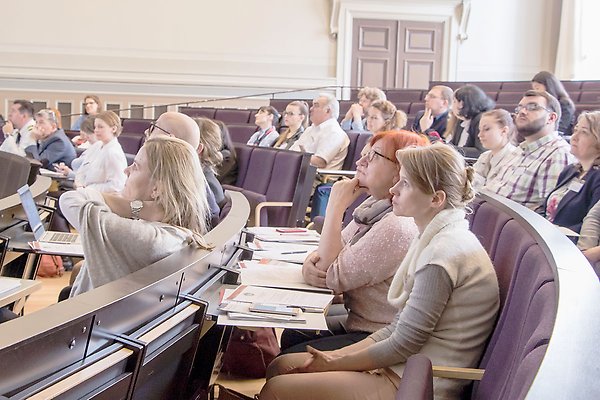
Uppsala 2019, participants at the BUP conference in the project Internationalization in Practice, funded by the Swedish Institute. Photo: Pontus Ambros
BUP Strategy 2021-2025
As the previous Strategy 2017-2020 was about to come to an end, reporting and reflecting as well as the planning for a new period 2021-2025 started in fall 2020. In short, the main focus of the work in 2017-2018 was on organisation, management, economy and communication. In 2019 student activities were on the agenda, 2020 the focus was on researchers. In the new Strategy 2021-2025, we will continue to develop the work we have started the latest years. However, the Action Plan for 2021 have the main focus on teachers and students, by developing new courses and modules and even some full courses, to be digitalised on the BUP Course Platform.
Networking, technology and the Covid 19 pandemic
Technology has brought us a number of new tools and platforms that facilitate the networking of students, university teachers, and researchers. In recent years, the BUP’s communication and outreach has become more planned, clear and effective. As a result, the BUP has a growing number of followers and subscribers on social media. All communication efforts contribute to maintaining and improving the lively network of BUP colleagues, within each of the ten BUP themes as well as in general.
A factor that forced us to learn and use new technology was the Covid-19 pandemic. The restrictions influenced our everyday lives as well as the work within the BUP. The need to move an increasing number of activities online represented a kind of “paradigm shift” in the BUP, with the positive effects of being more inclusive, and being able to give more colleagues the opportunity to attend activities.
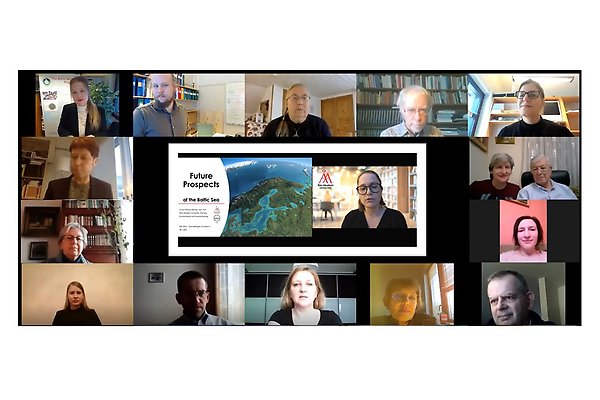
A montage from the Space Bridges 2.0.
The intensive use of technology is also a way to revisit our past, of working online and remotely across long distances. In the 1990s the BUP connected members of academia through satellite seminars. Now we are again interconnecting the teachers, researchers, and students of the Baltic Sea Region with the help of technology, and it shows that we were on the right track 30 years ago, and still are.
The BUP 3.0
The Baltic University Programme has grown to be one of the largest university networks worldwide, with a total of 97 participating universities at the end of 2021. There is undoubtedly more to say about these past years of the Programme, and even more to predict and wish for the future. As a result of passion for internationalisation and regional cooperation’s, teaching, research and innovations, and a hard work of hundreds of enthusiastic colleagues from the participating universities and its administrative and strategy-shaping bodies, the BUP is in good hands. Together we learn from each other, by communicating, cooperating and contributing to the Programme. The focus on sustainable develop-ment and education for sustainable development, as well as promoting inter-cultural and inter- multi- and transdisciplinary cooperation’s, is more important than ever.
About the author
Associate Professor, PhD, Madeleine Granvik has been active in the BUP since her days as a student. She took on the role as director while she was an Associate Professor at the Swedish University of Agricultural Sciences, focusing on planning for sustainable development of urban-rural interactions, with focus on Food Planning. Madeleine combines the BUP directorship with being an Associate Professor at Uppsala University, Dep. of Earth Sciences, Natural Resources and Sustainable Development, currently leading the research project on Resiliant Food Systems in Sweden.
